Ferguson, Missouri
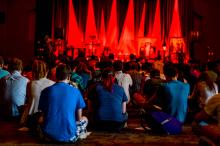
Participants joined with local religious leaders and city residents to walk through the city, stopping at various places of worship to sing and pray, in a demonstration of unity. The Walk of Trust ended on the campus of Saint Louis University, where Archbishop Robert Carlson of St. Louis, who first conceived of the meeting, spoke alongside the Rev. Dr. Traci Blackmon, a pastor in Florissant, Mo., and a leading voice in the response to Michael Brown’s death.

Like many of you, I’ve been overwhelmed and deeply saddened by the events that have transpired in Ferguson, Mo. And at times I’ve felt helpless, 350 miles away in Cincinnati, as friends of mine are in Ferguson praying, marching, organizing, and working for peace and justice.
In my conversations with friends of color, I have witnessed their pain and frustration and deep angst over the events of Ferguson. The past two weeks have hit very close to home for them.
With white friends, the response has been mixed, but the overwhelming sentiment is one I’ve already identified: helplessness. I am not satisfied with this response. I believe there are ways we can respond, bear witness, be in solidarity and work for justice in this moment. Our love for God and neighbor demands we engage. If you are like me, you are praying without ceasing for the Shalom, peace, and justice of God to reign in the hearts and minds and streets of Ferguson and throughout this nation and world. So how can we pair our prayers with constructive action?
Here are ten ways white Christians can respond to Ferguson.
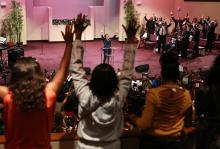
Civil rights leader the Rev. Al Sharpton told a packed church on August 17 that the Michael Brown case would mark a defining moment in civil rights history and fundamentally change the way police engage with the African-American community.
“Michael Brown is going to change this town,” Sharpton said to a massive, boisterous crowd that clapped and shouted in response.
Hundreds filled the pews of Greater Grace Church. More crowded into the foyer, and hundreds remained on the parking lot unable to enter, all in a show of support for the African-American teenager who was shot by a police officer on August 9.
Sharpton announced a future march in Washington on policing. He criticized the militarization of police, saying they act as if they are “at war with…citizens.” Sharpton urged the crowd to start showing up at the polls to vote and make a difference in the lives of African-Americans.
“Nobody can go to the White House unless they stop by our house,” Sharpton said. “We’ll be here until justice is achieved.”
 Editor's Note: Violence, anger, and confusion continues in Ferguson, Mo. Former Sojourners intern and current Digital and Creative Director for PICO Heather Wilson is reporting from the scene and shared her eyewitness account with Sojourners and others late Sunday night. We share it here as an important perspective in the ongoing unrest and confusion. Please keep the safety and wellbeing of all people in Ferguson in your prayers.
Editor's Note: Violence, anger, and confusion continues in Ferguson, Mo. Former Sojourners intern and current Digital and Creative Director for PICO Heather Wilson is reporting from the scene and shared her eyewitness account with Sojourners and others late Sunday night. We share it here as an important perspective in the ongoing unrest and confusion. Please keep the safety and wellbeing of all people in Ferguson in your prayers.
"Captain Johnson and the police force in Ferguson IS LYING, AND I AM BEARING WITNESS.
Two hours before curfew, I was photographing at the front of a peaceful march of all generations, calling for justice and peace in Ferguson. It was controlled and respectful—when someone stepped out the traffic lane they were marching in, they were directed back.
Without provocation, armored cars rolled up on us...yelled unintelligibly for 60 seconds and launched tear gas at us without warning. Women...children...even a woman in a wheelchair.
Captain Johnson is saying that bottles and Molotov cocktails were thrown at the front line. TONIGHT I CAN TESTIFY THAT THIS IS UNTRUE."
[view:Media=block_1]
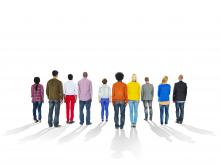
A study came out recently saying that millennials (a category that I apparently fit into) consider ourselves the “post-racial” generation. By and large, young adults think they are the ones who have moved past racism.
Except, that’s not true. Racism is alive and well.
Here at Sojourners I’m privileged to be a part of enlightening conversations about diversity, racism, sexism, and a whole host of other injustices. This makes it all the more frustrating when I try and continue those conversations outside the Sojourners community, and I’m met with resistance. Most of my friends are extremely uncomfortable discussing race. And not just because it’s a taboo subject; this is D.C., after all, and politics are always fair game in friendly discussion. Instead, I’ve found that my friends are so unsettled by the subject that they either try and change it, or they tell me it’s not about race, it’s about income inequality. Those arguments, which I follow up with “where do you think the income inequality came from?,” are still met with resistance, and arguments that if we could just bring people out of poverty, the racial disparities would vanish.
Except they wouldn’t.
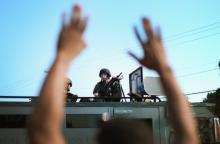
Over the past three weeks there have been four separate incidents that have led to the deaths of four unarmed black men at the hands of police. For many black people, myself included, the moments following these tragic events are filled with despair, sorrow, anger, and frustration. Each incident serves as a reminder that as a black man in America, my life holds little to no value in the eyes of the general public. To be young and black in the United States means to live under constant pressure, something most non-black American citizens know nothing about.
For the majority of black people, the police do not represent protection or safety, rather they are a menacing force that terrorize those they are supposed to serve. I have never felt safe in the presence of law enforcement. In fact, whenever police are in close proximity to me, I feel in danger. Whenever a cop drives behind me or beside me I feel anxious, not protected.
Is my paranoia justified?
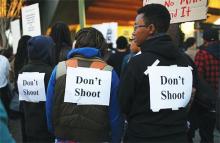
AFRICAN AMERICANS around the country are finding it is dangerous to call 911. Jack Lamar Roberson’s family in Waycross, Ga., discovered this the hard way when they placed an urgent call to 911 in October 2013 because his fiancée thought that he had taken an overdose of diabetes medicine.
Instead of sending EMTs, the dispatcher sent the police. Within 20 seconds of being in the house, police shot Roberson nine times, with bullets striking his back, arms, chest, and head as he held his arms up in the air. Although he was a veteran, he did not die from bullet wounds at the hands of strangers in a foreign land. Instead, white police gunned him down in his home.
Killings like this—which could be called anti-black hate crimes by police—are far too common. “Operation Ghetto Storm,” a 2012 report by the Malcolm X Grassroots Project, revealed that white police officers, security guards, or vigilantes kill an unarmed black man, woman, or child every 28 hours in the U.S. In 2012, police officers shot 57 people in Chicago—50 were black, two were white. Miami police officers killed seven black men within eight months in 2011. The Houston-based African-American News & Issues headlined an article this spring: “Open Season on Blacks in Texas: Cops Are Shooting First & Not Asking Questions.”
These police killings of black people emerge out of a culture and system of white supremacy. In such a context, police killing of black people is not a black problem. It is an American problem that shreds the curtains of democracy.